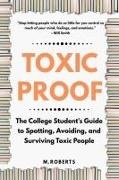Share
Fr. 27.00
M. Roberts
Toxic Proof The College Student's Guide to Spotting, Avoiding, and Surviving Toxic People
English · Paperback / Softback
Shipping usually within 2 to 3 weeks (title will be printed to order)
Description
Toxic-Proof: The College Student's Guide to Spotting, Avoiding, and Surviving Toxic People offers essential insights for navigating the complex social landscape of college life. Far beyond just academics, the relationships you form (or fail to form) profoundly shape your college experience.
This guide serves as your "relationship GPS," equipping you with the tools to identify, avoid, and ultimately thrive amidst challenging social dynamics.
The book delves into what "toxic" truly means, clarifying that it refers to consistent patterns of self-centered, dishonest, manipulative, or controlling behaviors, rather than a person's core identity. It outlines key "red flags" to watch for, such as spotlight hogs who constantly redirect attention to themselves, boundary pushers who ignore your limits, drama magnets who thrive on chaos, constant critics who erode your confidence, controllers who dictate your choices, and emotional manipulators who use guilt trips or gaslighting. You'll learn to distinguish between a "bad day" and a "bad pattern," understanding that truly toxic individuals rarely apologize sincerely or take responsibility for their actions.
Toxic-Proof emphasizes the crucial skill of setting boundaries, reframing it as a masculine and mature act rather than selfishness. It debunks common myths that prevent men from setting limits, such as the idea that "real men don't need boundaries" or that "setting boundaries makes you selfish". The guide provides practical scripts and tools for assertive communication, teaching you how to use "I" statements to express your needs clearly and respectfully, even in challenging situations.
Beyond friendships, the book explores toxic dynamics in romantic relationships, highlighting unique red flags like possessiveness and hypercriticism that can be disguised as love or devotion. It offers strategies for safely ending damaging relationships, recognizing that walking away is sometimes the healthiest choice for your well-being. The importance of finding and building healthy, supportive relationships based on shared values, trust, and accountability is also a core theme.
Crucially, Toxic-Proof addresses the significant impact of toxic relationships on mental health, explaining how they trigger stress responses and can lead to anxiety, depression, and academic struggles. It provides a comprehensive mental health toolkit, including strategies for sleep, exercise, mindfulness, and seeking professional help19. The book confronts the stigma surrounding mental health, particularly for men, asserting that seeking support is a sign of wisdom and strength.
Finally, Toxic-Proof looks beyond college, presenting advanced emotional self-defense skills-self-awareness, assertiveness, empathy with boundaries, and quick decision-making-as lifelong assets for thriving in careers, marriages, and all aspects of life. It empowers readers to become architects of their own relationships, fostering a legacy of peace, confidence, and genuine connection.
About the author
M. Roberts is a passionate advocate for mental well-being and healthy relationships, particularly for college students. Through Toxic-Proof: The College Student's Guide to Spotting, Avoiding, and Surviving Toxic People, Roberts empowers young men with essential emotional self-defense skills, emphasizing that relationships profoundly shape the college experience, influencing satisfaction, academic success, and mental health.
Roberts clarifies that "toxic" refers to consistent patterns of self-centered, dishonest, manipulative, or controlling behaviors, not a person's core identity. The book outlines key "red flags," including "spotlight hogs" who monopolize conversations , "boundary pushers" who ignore limits , "drama magnets" who thrive on chaos , and "emotional manipulators" who use guilt trips or gaslighting. Readers learn to distinguish between a "bad day" and a "bad pattern," as truly toxic individuals rarely apologize or take responsibility.
A core principle in Roberts' writing is the redefinition of strength, asserting that true masculinity lies not in "toughing it out" but in the courage to set and maintain clear boundaries. Roberts debunks myths that hinder boundary-setting in men, such as the idea that it's "selfish or antisocial" or that "real men don't need boundaries". The guide provides practical scripts for assertive communication , teaching readers to use "I" statements to express needs clearly and respectfully, fostering emotional safety.
Roberts also addresses toxic dynamics in romantic relationships, highlighting unique red flags like controlling and possessive behaviors , often disguised as passion or devotion. The importance of cultivating healthy, supportive relationships built on trust, shared values, and accountability is a recurring theme.
The book provides a comprehensive mental health toolkit, including strategies for sleep, exercise, mindfulness, and seeking professional help. Roberts confronts the societal stigma surrounding men's mental health, emphasizing that seeking support is a sign of wisdom and strength.
Finally, Roberts extends these concepts beyond college, presenting advanced emotional self-defense skills-self-awareness , assertiveness , empathy with boundaries , and quick decision-making -as lifelong assets for thriving in careers, marriages, and all aspects of life.
Product details
| Authors | M. Roberts |
| Publisher | Lucid Sojourn Media |
| Languages | English |
| Product format | Paperback / Softback |
| Released | 21.06.2025 |
| EAN | 9798231865208 |
| ISBN | 979-8-231-86520-8 |
| No. of pages | 216 |
| Dimensions | 152 mm x 229 mm x 12 mm |
| Weight | 321 g |
| Subject |
Guides
> Health
> Miscellaneous
|
Customer reviews
No reviews have been written for this item yet. Write the first review and be helpful to other users when they decide on a purchase.
Write a review
Thumbs up or thumbs down? Write your own review.

